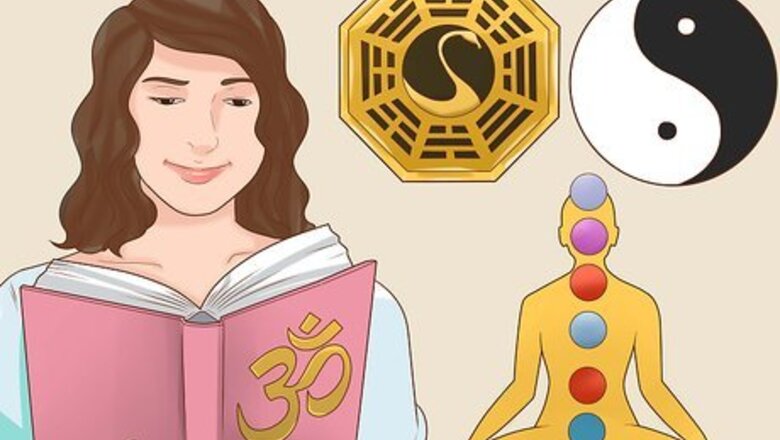
views
X
Research source
Even though several millennia have passed since it began, several core principles still make up the essence of Hindu philosophy, belief, and ritual practice. If you are interested in become a Hindu follower, leaning and following these principles are your first steps on the path to enlightenment.[2]
X
Research source
Learning the Basics
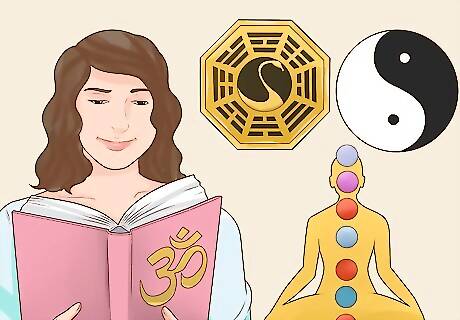
Study the main concepts of Hinduism. Hindu is one of the oldest religions in the world, originating before recorded history on the Indian subcontinent. It’s vital to begin your entry into this religion through an appreciation of its foundation elements. The Trimūrti is a concept in Hinduism "in which the cosmic functions of creation, maintenance, and destruction are personified by the forms of Brahma the creator, Vishnu the preserver and Shiva the destroyer or transformer." However in most Puranic texts, Brahma's creative activity depends on the presence and power of a higher god. Traditionally, Hinduism prescribed a strictly ordered social varna system with 4 main groups: Brahmin (priests), Kshatriyas (nobles and warriors or leaders), Vaishyas (craftsmen and farmers or profit-minded), and Shudras (skilled/unskilled laborers). With possible myth, a fifth “untouchable” class which is said to be outside of the Varna system, doesn't exist. Hindu religion doesn't divide people into categories and classes. The Varna system defines one's varna quotient and one can possess all varna quotient with one or more prominent. Karma refers to a cause-and-effect system where one’s deeds and acts influence what happens in life. Each person creates their own destiny through their actions in life: if one conducts good deeds, they will reap good consequences later on in life. Dharma refers to God’s divine law which orders the cosmos. When we follow dharma, our souls are brought into harmony and advanced towards God, truth, and righteousness. Reincarnation, also known as punarjanma, is a cyclic process of birth, life, death, and rebirth. Instead of an afterlife, as is found in Judeo-Christian religions, Hindus believe that the immortal soul continues to exist after the death of the body, and is reborn into subsequent new bodies. The actions that one completes in life (their karma) influence how the souls is reborn (for example, as a lower order life-form). Once one resolves or “perfects” their karma, the soul breaks free from the reincarnation cycle. Hindus also traditionally believe in Chakras. There are 7 Chakras, or energy centers, located throughout the body and connected to one’s spirit. Believers can purify or open up their Chakras through yoga mediation. While there is a wide array of perspectives on the “Divine” as well as a host of deity figures, all Hindus worship a Supreme Being who is unchanging, all-present, timeless, formless, and pure love.
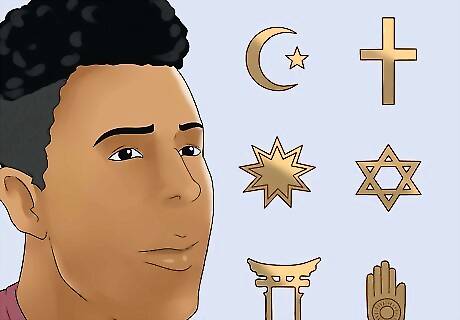
Embrace pluralism. More than most major religions, Hinduism accepts and even celebrates pluralism. It is open to multiple types of practices and traditions. The Hindu phrase, “May good thoughts come to us from all sides,” reflects this open and accepting nature. It indicates that all can (and should) seek out enlightenment from multiple sources and perspectives rather than from one dogma. Hindus do not ascribe to any one creed, and do not believe that there is any one singular view, reality, or way to reach God. Contemporary Hindus tend to practice tolerance and acceptance as an important religious virtue, rather than being exclusionary or narrow-minded.
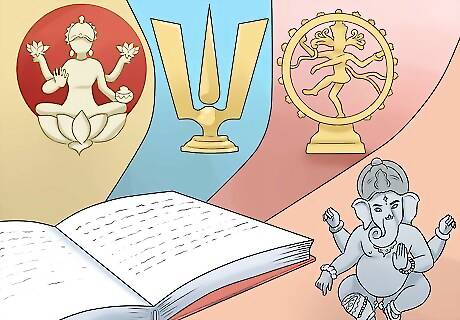
Learn about the main denominations. There are 4 main denominations within Hinduism. Though each have their differences, they also share a common purpose: to further the soul's journey towards its divine destiny. Under Shaivism, Hindus worship the Supreme God as Shiva, (“the Compassionate One”). Shaivite Hindus value self discipline, follow a guru, worship in a temple, and practice yoga in order become one with Shiva. Followers of Shaktism worship the Supreme as the Divine Mother, Shakti or Devi, and use chants, magic, yoga, and other rituals to channel cosmic forces and awaken one’s spine Chakra. In Vaishnavism, worshipers seek the Supreme as Lord Vishnu and His incarnations, Krishna and Rama. Vaishnavites are deeply devotional and invested in saints, temples, and scriptures. Followers of Smartism, worship the Supreme in one of six forms: Ganesha, Shiva, Shakti, Vishnu, Surya and Skanda. They accept all the major Hindu Gods and are thus known as the most liberal or nonsectarian Hindus. They follow a philosophical, meditative path and strive after oneness with God through understanding.
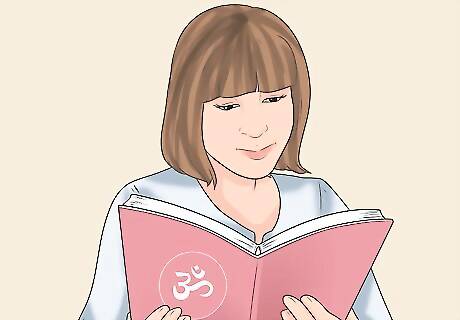
Read the major sacred texts of Hinduism. These texts were written at different times in Hindu history and offer different perspectives on Hindu tenets. The Bhagavad Gita (usually considered part of larger book, Mahabharata), is a central text of Hinduism. It is structured as a philosophical dialog between the deity Krishna and the warrior Arjuna. The Bhagavad Gita is consider to be the most popular and accessible of the sacred texts and is the ideal book to start with as a beginner interested in Hinduism. The Vedas are another primary Hindu text. There are 4 books in the ‘’‘Vedas’’’(the Rig Veda, Sama Veda, Yajur Veda and Atharva Veda) which contain hymns, incantations, rituals, a unique view of everyday life in ancient India. The Upanishads detail how the soul (Atman) can be united with the ultimate truth (Brahman). This is accomplished through contemplation and mediation, as well as establishing good karma. The Puranas offer a narrative history of the Universe from creation to destruction, as well as tales of kings, heroes, and demigods.
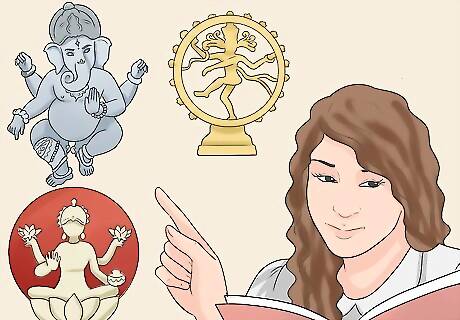
Familiarize yourself with the Hindu deities. In the Hindu pantheon, God takes on many forms and appears as several deities. While it is commonly stated that there are 330 million Hinduism deities, there are some main or more recognizable ones that you should try to learn. Ganesha (elephant god) is the son of Shiva and considered to be the god of success, prosperity and divinity. Before starting any main activity (like a new business, purchasing/building a house, doing daily pooja, etc.) Ganesha is the first to be worshipped. Brahma is the creator of all reality. Vishnu is the preserver of order. Shiva is the God of Gods. He is also tasked with the destruction of the universe, so it can be remade. Saraswati"' is the Goddess of knowledge, music, arts and wisdom and consort of Brahma. Lakshmi is the Goddess of all wealth and consort of Vishnu. Parvati/Durga is the Goddess of Power, strength and valour and consort of Shiva
Converting to Hinduism
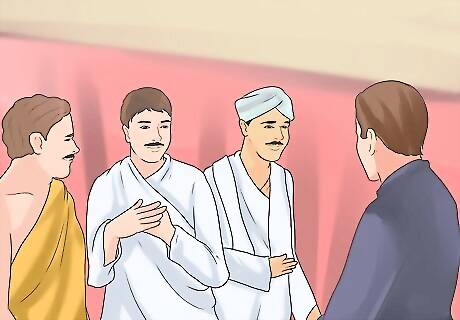
Join a Hindu community. This is the first step in completing an “ethical conversion” to Hinduism. Search the internet for Hindu temples in your area and stop by to learn more about them and their services. The goal of joining a Hindu community is to become accepted by your local practicing members, as well as gain their help in completing the daily and constant rituals (see section on Practicing Hinduism). If there are no Hindu temples in your area, you can always join an online community, so that you can at least connect with fellow followers virtually .You can also call a priest over and make a praying area for pujas in a small part of the house.

Distinguish between your past and present beliefs. The next step towards conversion is to create a point-counterpoint list of the beliefs help by your previous religion (if you had one) and the belief of Hindu. This exercise will help you take stock of what you will be leaving behind and embracing through your conversion.
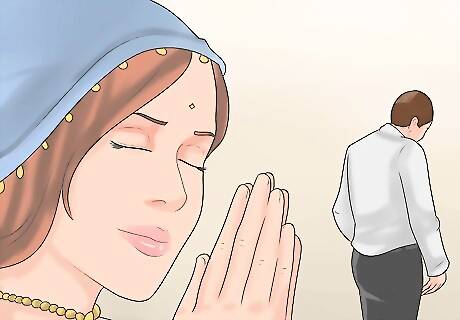
Sever from former mentors. An important element of Hindu philosophy is detachment, and you can start to practice this by leaving behind mentors and sources of influence from your former life, especially if they are not supportive of your conversion decision. Converts from former religions are encouraged to share their desires to join Hinduism with their past religious mentors, and allow their mentors to try to change their mind. Converts are to request a letter of severance from their past religious mentors, indicating that they have terminated their involvement with that religion in order to become a Hindu.

Adopt a Hindu name. Coverts are asked to perform a legal name change and take on a Hindu name as part of their conversion process. Hindu names are usually based on Sanskrit or Indian name, and are especially drawn from Hindu deities and mythologies. Technically, one is asked to change both their first and last name, and to make these legal changes on all their documents (driver’s license, passport, work documents, etc.) Popular Hindu first names for boys include Aarav (Peaceful, wisdom, musical note), Vivaan (First rays of the sun, full of life), and Aditya (the sun). For girls, popular first names include Saanvi (Goddess Lakshmi), Aanya (grace), and Aadhya (Goddess Durga).
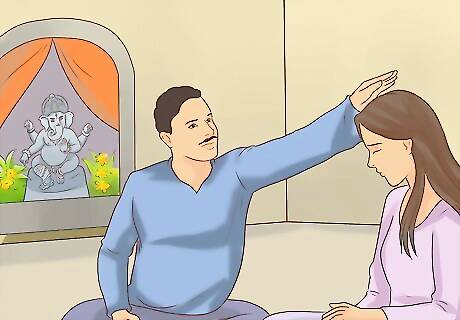
Have a traditional Hindu name-giving ceremony. This ceremony, also called a nama karan sanskara, is performed at the temple and is where the new Hindu name is conferred, vows are taken, and the certificate of conversion is signed.

Publicly announce your conversion. After all the previous steps are completed, the new convert is asked to publish a 3-day announcement in their local newspaper proclaiming their name change and conversion. This announcement should be copied and saved for proof of conversion.
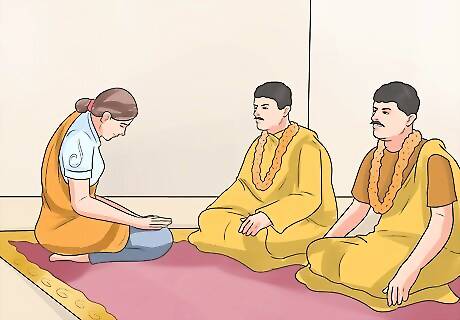
Enjoy a “welcoming” ceremony. To celebrate your home coming into the Hinduism, a traditional vratyastoma ceremony is thrown in your honor.
Practicing Hinduism

Uphold nonviolence and be kind to all living things. Hindus believe that all life is sacred and therefore should be loved and revered. As a practicing Hindu, try to be sensitive to all life forms, big and small. Practice nonviolence (ahimsa) in thought, word and deed. In other words, try not to be hurtful or harmful to other living things in the things you do, say, or think. Consider becoming vegetarian. Many Hindus, though not all, practice vegetarianism as a way to show care and respect for animal life. Though all animals are considered sacred in Hindu culture, cows are especially revered as holy. According to an ancient Hindu story, the original cow, Mother Surabhi, was a treasure churned from the cosmic ocean. Beef is never eaten in Hindu cuisine, though the 5 byproducts of cows -- milk, curd, butter (ghee), urine, and dung -- are revered as sacramental objects. It is considered an important and holy duty (a dharma) to feed animals. Many Hindu households will ritualistically offer food to ants, for example, or offer sweet delicacies to elephants on special holidays.
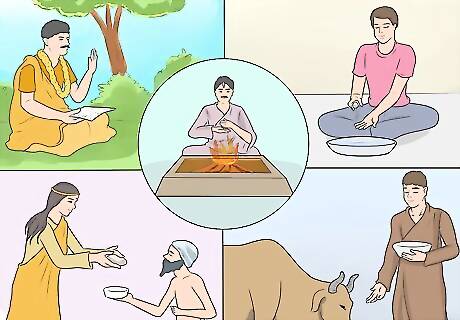
Perform the 5 daily duties (pancha maha yajnas). These daily duties, or homages, are performed by every Hindu householder. Brahma Yajna involves paying homage to Brahman by teaching and studying scriptures. Deva Yajna involves paying homage to Gods and universe elementals by building fire. Pitri Yajna involves paying homage to the ancestors through the offering of water. Nara Yajna involves paying respects to human guests, helping the poor and downtrodden Bhuta Yajna involves paying homage to beings by offering food to all creatures.
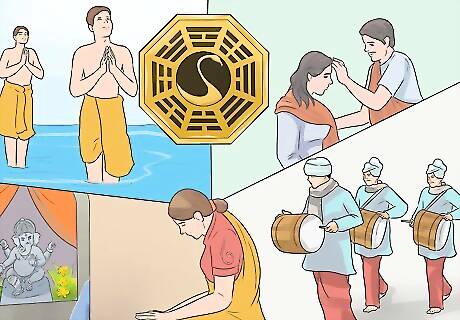
Practice the 5 constant duties (pancha nithya karma). In addition to the 5 daily homages listed above, Hindus practice 5 karmas, or pious acts, as listed below. One should pursue righteousness (dharma) and live a virtuous life of purity, respect, self-control, detachment, selflessness, and striving towards truth. One should partake in pilgrimages (tirthayatra) where you regularly visit holy persons, temples, and sacred pilgrimage sites. Such journeys provide freedom from routine life and thereby freshen the mind. Pilgrimages also help to create a sense of togetherness in the family, since all members undertake the pilgrimages together. One should keep the Holy Days (Uthsava) by participating in festivals, celebrating holy days in the home or temple, and observe fasts. Hindu sages tell us that occasional fasting prevents bodily diseases, restores the body's healing power, and heals the mind by removing lust, anger, hatred, pride, and jealousy. One should perform the sacraments (samskaras) as outlined in the scriptures and that mark an individual's passage through life. One should proclaim that “God is in all” (Sarva Brahma) and look for God in all beings.
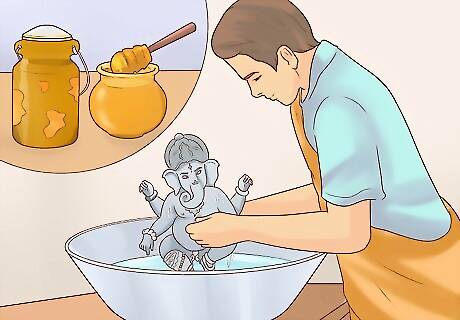
Worship the gods through Puja. Puja is the central act of Hindu worship. Puja can take place be in a temple setting or at home. In puja, one worships a Hindu god by bathing a statue/reliquary of it in milk, curds, honey, butter, and water before dressing it in rich fabrics and anointing it with jewelry, flowers, sandalwood, and incense.

Take up other Hindu practices. In addition to these traditional practices, consider following other Hindu acts which are becoming increasingly popular in mainstream culture. Ayurveda is an ancient Hindu system of holistic healing and wellness that is finding new popularity in the west today. Hatha Yoga has been adapted from Hindu practice as a way to bring meditative movement to the masses. Saying the “Namaste” greeting while bringing together both palms of the hands before the heart has become popularized as a humble way of greeting people.



















Comments
0 comment